slurg
 lordmarcovan
Posts: 43,608 ✭✭✭✭✭
lordmarcovan
Posts: 43,608 ✭✭✭✭✭
I went out detecting on Saturday the 29th, returning to Gascoigne Bluff on St. Simons Island, but the day's results weren't very exciting. Probably the only relic of the plantation era I found on the Bluff was a blob of lead which might have once been a musketball. That, a modern aluminum token, and about fourteen cents in modern change were the net dividends of the day.
I finished Saturday's hunting on the mainland in Hanover Square, a city park, but didn't get much detecting done, because I ran into my new friend Ty Herig, who lives adjacent to the park. Ty had just started metal detecting, and had a borrowed detector with him. We struck up a conversation while his dog (and cat!) followed us around the square.
The sun set on us before there was much time to find anything, but he did invite me into his backyard for a few minutes and I dug an old brass handle of some sort that probably came off a carriage door. I gave it to him, since he found it interesting. As I have a whole drawerful of stuff like that, I wasn't terribly impressed with the find, myself. Ty mentioned an old token he'd found in the yard of an old house nearby.
"It says 'ATLANTIC SHRIMP COMPANY, BRUNSWICK & ST. AUGUSTINE', and it's about the size of a quarter," he remarked.
I said, "Wait, don't tell me- the reverse says 'GOOD FOR 15', doesn't it?"
"How'd you know that?"
"Because I dug one just like it nine or ten years ago, over near King's Square. It's one of my favorite old tokens. Note that it doesn't say 'good for fifteen cents. It just says 'GOOD FOR 15'. That always made me wonder. Good for fifteen what? Shrimp?
"I was talking to an old timer about that," he replied. "Apparently it was a voucher of some sort. You see, the shrimp company only paid on Fridays, so they handed out these tokens to the shrimpers when they brought in their catch. The shrimpers cashed the tokens in at the end of the week."
"Aha! So maybe it was good for 15 pounds of shrimp? I mean, it showed that the shrimper had brought in fifteen pounds, or something like that? Fifteen still seems like a strange number for a token."
"Yeah, it was something like that. Anyway, I was really happy to find it. And I found an old Cracker Jack toy while digging- it was this little guy with a guitar, and I'm a guitar teacher, so that's kind of neat."
"I'll bet you were psyched. I was really happy when I dug mine, and considered the find to be as good as an old silver coin would've been. And your little guitar guy you found must be a good omen- you must be destined for great finds. By the way, regarding that token, I did some looking in the city directories when I found mine, and I believe the Atlantic Shrimp Company was listed in the 1934 directory but not in the 1937. Or something like that. It was hard research because the library had a lot of gaps in the old directories. But the tokens likely date somewhere between the 1890s and 1930s."
(Here's a picture of my Atlantic Shrimp token. I dug it back in April of 1995. Mine was found only a couple of blocks from where Ty got his, and also on Richmond Street, near the corner with Prince Street. I dug it in a sidewalk strip near King's Square.)
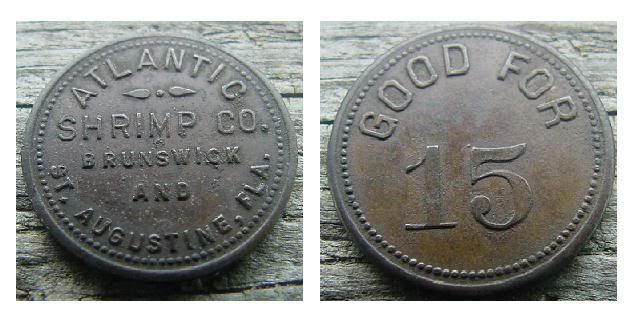
I asked him about where he'd found his. "So, you say you found your shrimp token at the old house two doors down?
"Yeah, the house is under renovation and the owner lets me detect there. Wanna go look at it?"
"Sure!"
So we went and looked at the house, a lovely old Victorian that had been built in the 1880s, as had most of the block. Ty said we could hunt it Sunday if we wanted. I took one look at that front yard, which faces Hanover Square, and I knew I wanted to hunt there very badly, indeed. Visions of Indian cents and Barber and Seated Liberty dimes filled my head, and I practically salivated at the thought of detecting there. I seldom get the chance to search such pristine territory, since I am fairly shy about knocking on people's doors and asking permission. I feel like a salesman or telemarketer making cold calls. So I usually end up hunting public property, which means the same old parks, sidewalk strips, and medians, over and over again. Those public places still produce for me, but the easy finds are long gone, and my haul of old coins and relics seems to grow smaller every year. But of course I don't go out detecting as much as I used to.
I could scarcely sleep for anticipation of having a fresh detecting site. Sunday dawned cloudless and mild- a gorgeous, postcard day for detecting! My wife and I went out for breakfast and I called Ty to let him know I was on the way. Since he had said he wanted to sleep in a bit, we had agreed to meet after 10:00 AM, but by the time my wife and I finished breakfast and I got to Ty's house, it was after 11:00, and the day was becoming pretty warm.
Before leaving, I'd taken a silver coin with me to give to Ty, to thank him for getting me into one of his detecting sites. I thought maybe I'd have a little fun with him, too, and "plant" the coin somewhere near him so he would "find" it with his detector and get an adrenaline rush. For this purpose, I selected a 1780 Maria Theresia thaler restrike out of a batch of silver I'd recently bought: a big, hefty piece of silver. Because these were struck by the Austrian mint well into the 20th century, they aren't as old as their "1780" date suggests, but they still have as much silver as an original, making them worth ten bucks or so on today's market. And I didn't think Ty was likely to know much about them, so his finding a big silver coin dated 1780 could be very amusing to watch. Unlike a lot of the restrikes, this one was actually well-circulated, too, making it look pretty old. (Well it is pretty old, just not 227 years old like the date would indicate). Into my pocket it went, for future pranking purposes.
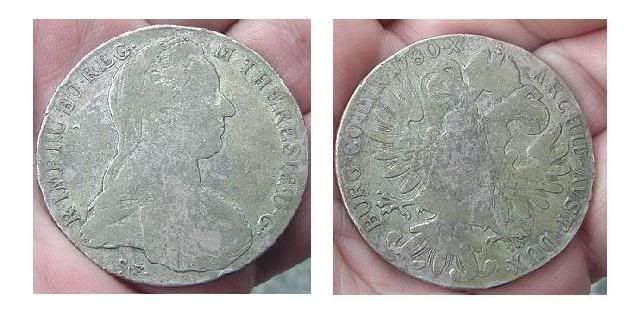
As I rolled up in front of Ty's house, I saw him waiting on the porch, with Lily the dog and Mikey the cat in attendance, as usual. The cat was dirt-rolling on the sidewalk in some sort of strange feline greeting ritual- I find my own cats doing this when I get home from work. They run up to greet me, and then start rolling on their backs. It's pretty funny.
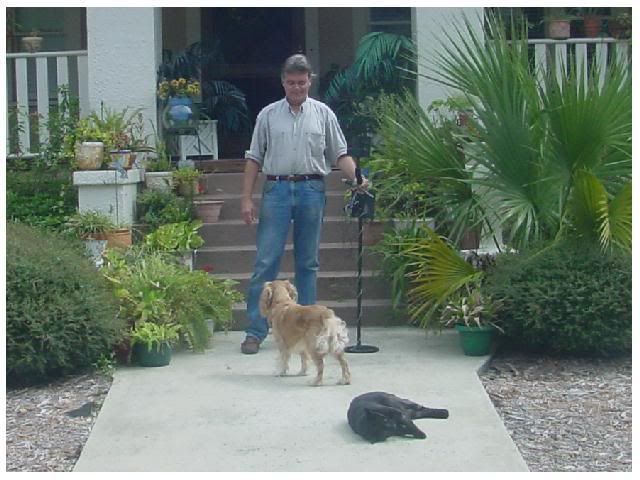
After greetings and a brief chat, we walked two doors down to the house were going to detect. I briefly crossed the street and stood in Hanover Square to snap a picture of the house, which is at 1020 Richmond Street.
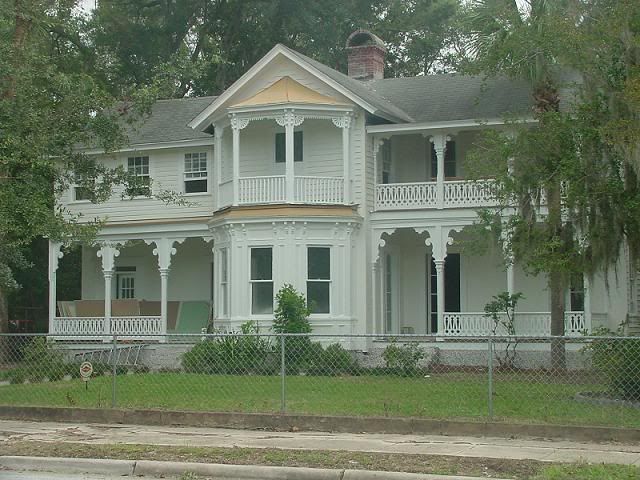
I decided to sweep the front yard in a back and forth "lawnmower" pattern, rather than my usual random zigzags. Once inside the gate, I started with the right side and began working along the edge of the property, where the fence runs along the sidewalk. It wasn't long before I had my first signal, which registered in the middle scale, roughly between the "pulltab" and "screwcap" ranges on the meter. Lots of trash items are found in this range, but so are many old Indian Head cents and some gold rings. This signal had a little depth to it, about four inches, so it was worth digging.
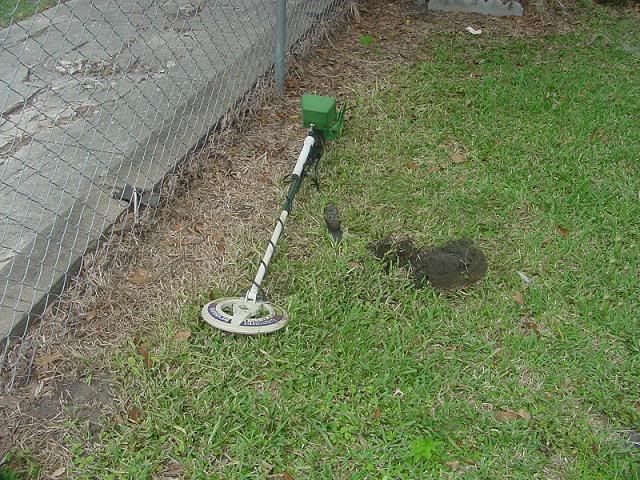
With visions of Indian cents again dancing in my head, I was momentarily surprised when I turned the plug back and found the coin perfectly placed within it.
It was immediately obvious that my first find of the day was a silver coin!
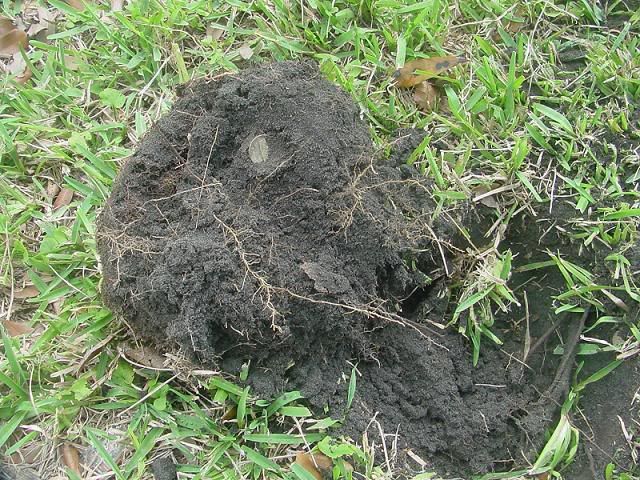
I could see it was a War nickel, so called because the United States struck five-cent pieces in 35% silver during World War II, from 1942 to 1945. Not only does their silver content give them a slightly different color, but they also have a large mintmark over the dome of Monticello on the reverse. I could see the big "S" mintmark of San Francisco over the building's dome, and the coin was a silvery color, while a regular dug nickel would have been a dirty reddish brown. That's the beauty of silver, even lower-standard silver like the .350 alloy in the War nickels. Our modern coins turn all ugly and dirty in the ground, while the older coins with precious metal content like silver and gold often stay nice and bright- for decades, if not centuries.
This was a 1945-S War nickel. It is now Coin #294 in my "keeper" album of dug coins, my 183rd silver coin, and my tenth War nickel. It's also a date I hadn't dug previously. So while it's not a tremendously valuable find, it is silver, and silver is good! And I added one for the book, so that made me happy. The day was off to an auspicious beginning.
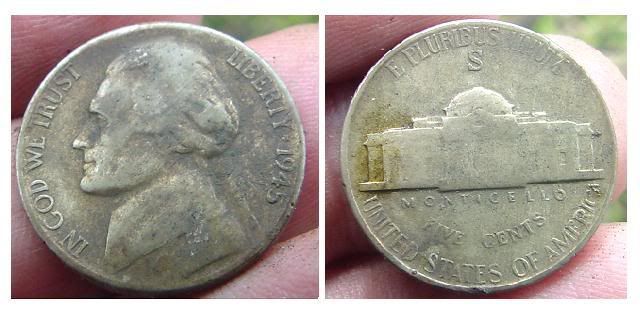
Ty came over with a 1957-D Wheatback cent, the first "Wheatie" of the day. Surely there would be more. For a novice detectorist, digging a Wheatie is usually a thrill. Ty had already crossed that threshold and dug three or four, but he was pleased. Maybe he'd get his first silver coin today. He admired my War nickel.
My next signal had a little depth to it; four or five inches or so, according to the detector's meter, and it signaled very much like a coin, hovering near the "penny" and "dime" range. A coin at four or five inches in a yard like this could very possibly be from the late 19th century. For some reason I got strong visions of a Barber dime, and the feeling that I'd be going home with at least one. (For non-numismatic readers, the "Barber" dime is named after its designer. They were struck from 1892 to 1916, in silver, of course). I knew without a doubt in my mind that there were at least a few (if not a lot of) Indian cents and a Barber dime or two in this yard.
Alas, this signal did not turn out to be my much-anticipated Barber dime. It was an old coin, though: a 1925 Lincoln cent. My first Wheatie of the day. Wheaties are always a good sign, and earlier Wheaties even moreso. I don't put Wheat cents in my "keeper" album, having found a quart jar full of them over the years, but I still enjoy digging them. Where there are Wheaties, there are often nice silver coins, too. I find that my ratio is usually about ten Wheaties for every silver coin.
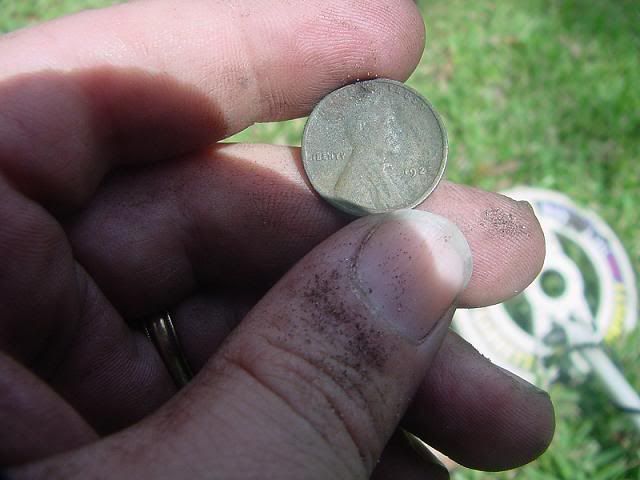
Not long after that Wheat cent appeared, I dug another. And then another, this one from 1912. So the old stuff was coming up, now! Right next to the 1912 I found yet another Wheatie, this one from the 1950s. The 1912 was well-circulated, while the 1950s cent was high grade, and it looked like they could have been dropped at the same time. Not very far from those, but perhaps not in the same spill pattern, I dug a 1917. It came out of the ground looking quite nice for a dug Lincoln cent.
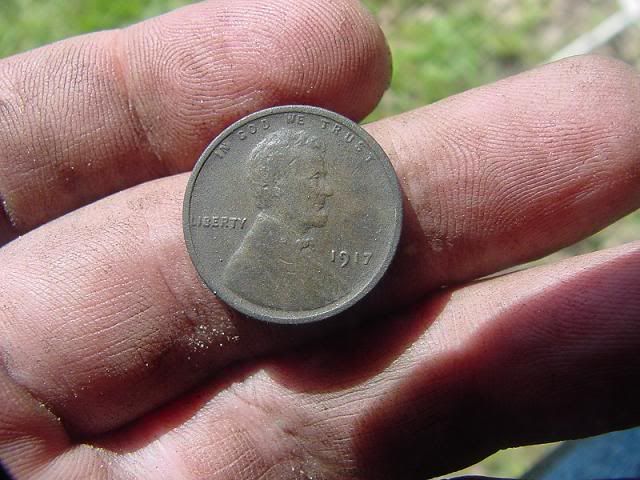
The Wheaties were popping up everywhere. Sometimes they read in the penny-dime range on the detector's meter, and sometimes they fell down into the middle range below coin level. This happens sometimes when a coin has been in the ground a long time. The earlier Indian Head cents often read well below "penny" range, as I mentioned earlier. So far no Indians had appeared, but they had to be out here.
By now the sun was high in the sky and after working the middle of the yard, away from the shade, I was starting to sweat and feel thirsty. What started out as a gorgeous, mild day was still gorgeous, but turning rather hot. Soon the sweat began to drip off my forehead and run down my nose. Ty took a break and walked back to his house, returning with some cold bottles of water. They were a welcome relief, because after a big breakfast and all that physical exertion in the bright sun, I was starting to feel a little woozy. While we took our break the owner of the house drove up, and chatted with us before going inside to supervise the painting and renovation inside. We thanked him for his hospitality.
After resuming the hunt, I kept finding Wheat cents. Soon I was up to eight, then nine. The ratio of trash to coins was very good. I dug one or two pieces of junk and the odd artifact or two, but the coins kept right on coming, and I was finding more old Wheat cents than I was modern coins. When I found the tenth Wheatie, I began to wonder where those Indian cents and the Barber and Mercury dimes were hiding. By this time I had a pocketful of coins and stuff and had completed my loose "lawnmower" pattern of both halves of the front lawn.
Ty often asked me to check his holes with my detector, to get a second opinion about some signals. When he asked for help pinpointing one particular signal, I knew the moment for "The Prank" had arrived.
Secretly slipping the Maria Theresia thaler from my pocket, I palmed it and made a pretense of digging around in his hole. While my hand was down in there, I shoved the big silver coin into the dirt in the side of the hole. I told him I thought the target was a little to the right, and walked off as he resumed poking around. Suppressing a chuckle, I looked back as he dug around a bit, and then I watched the expression on his face change as he brought something out. He stared at it silently for a second, then let out a quiet, rather subdued expression that sounded something like. "Whoa, Betty." Then when he started to stand up and come towards me, I could see his eyes had widened considerably. Rather than jubilant and shouting, he seemed a bit stunned.
Haha. Gotcha.
"Hey, Rob, look at what came out of that hole! WHAT IS IT!?!"
"It's a 1780 Maria Theresia thaler," I said, without even looking.
"Wow, you knew what it was, just like that? How?"
"Because I put it there."
"Whaaa-!? AW, MAN! No, you didn't!"
"Yep. Sure did," I said with a grin. "I wanted to give you a little somethin' to thank you for inviting me here today, but I also wanted to have a little fun with you."
He tried to give the coin back, but I told him no, I wanted him to keep it. I explained to him how it was a restrike, and I wasn't giving him a rare coin worth thousands of dollars, but rather a "thank you" gift of a bit of silver. I often play pranks like this on people, but I always confess in the end, and let them keep the coin. Then I went back to his hole and found his actual target, which was out in the loose dirt on the ground. It was a crusty modern zinc cent. "Here's your real target," I said, flipping it to him.
After the hilarity of "The Prank" subsided, we decided to go around to the even larger back yard and try things out. It was bare dirt, having been scraped and plowed up in the course of the renovation. Normally I prefer "naked dirt" for detecting; it's easier to dig in, for one thing. But it was obvious that this back yard had been thoroughly trashed- we could see bits of trash like aluminum cans and pieces of pipe on the surface, and there was a big construction dumpster and a lot of junk lying around. I soon decided the back yard was not my idea of fun. No doubt it had its share of old coins and goodies, too, but it would take considerably more patience to hunt, and knowing I had proven results in the front yard, I decided to go back.
I dug some more trash in the front yard, and battled with roots several times. Exasperated, I told Ty about my "Ten Wheaties to One Silver" ratio, which meant I was due for some silver. But I just wasn't finding it. Sure, I'd started the day with a 35% silver War nickel, but those elusive 90% silver dimes and quarters (and halves and dollars, oh my!) were still playing hard to get.
Three or four times I got "quarter" signals, but two of these turned out to be modern clad quarters, while the others turned out to be things like brass keys and an old spigot handle and an old spark plug gauge. On one signal I dug a pair of old Ford keys-both the trunk and ignition keys were strung together on a twist of heavy-gauge wire. Ty joked, "I'll bet those are from a '68 Torino," and he might have been right, but I remember my old '84 Ford van having the same kind of keys. He was probably closer to the truth, though- these had been buried quite a while. I can imagine the car owner cursing as he paced around the house and yard, looking for his lost keys.
Snap! Ty broke his cheap gardening trowel in two while digging. Every beginning detectorist starts out with one of those, which invariably bends and then breaks within two weeks, if not sooner. It must be a rite of passage. I loaned him my raggedy-looking but basically indestructible hori-hori knife, since I also had a small contractor's shovel with me. The shovel could cut through small roots better than the dull hori-hori knife, but wasn't as good for precision work around and under the roots that were too big to cut.
Then I got another coin range signal. I dug down, finding a network of criscrossing roots, as usual. Damn. These were becoming a real aggravation. It seemed like every hole was full of them. Since Ty had my hori-hori knife, I had to work between the roots with my fingers, as they were too thick for the shovel to cut. Finally, after some Herculean tugging, I was able to part them enough to get around them with my fingers, and after five or ten minutes of struggle and a few ant bites to my hand, I found...
Nothing.
The signal vanished. Grrr! I kept trying, but I couldn't get anything, despite widening the hole and going deeper, digging halfway to China. This happened several times to both of us. Sometimes it was because of a rusty iron target breaking up, but other times, well... who knows?
So it goes. You can't hit a home run every time you're up to bat.
The next signal was a midrange one, and produced a small, oval-shaped toy badge. It said "CAPTAIN BRADDOCK" on it and looked similar to a miniature Los Angeles police badge. I figured it must have been a premium from some old radio serial or early TV show from the 1940s or '50s. An Internet search upon my return home showed that Captain Braddock was the lead character in a TV show called "Racket Squad", which aired from 1951 to 1953. The title referred not to tennis, but to racketeering- apparently Captain Braddock made his living in TV Land by busting con men and fraudsters. While I'd never seen the old black and white show, I can imagine it: I'm sure he had a hard, nasal voice and barked out commands to his underlings while delivering snappy, sarcastic one-liners to the crooks he busted. The old TV promo badge and the occasional marble that turned up in the course of digging were sure clues that this yard had been a play spot for children fifty years ago. Perhaps this also explains the large number of pennies, too.
Ty wandered around the side of the house and dug a few targets from under the pine straw. He came back around with something to show me. It was a nonmetallic artifact, not something he'd found with the detector, but rather an item which had turned up in one of the holes he dug. It was a little man with a huge head and bared teeth, who looked like he was screaming, or singing. It was made of red plastic and might have been thirty or forty years old. It did have a rather 1960s Beatlemania look to it. Ty said, "He's got a guitar, too."
"No way," I said. "You've gotta be kidding me."
He wasn't. Sure enough, when the dirt was brushed away from the little figurine, it could be seen that the strange little red toothy guy was playing a guitar!
So Ty, the professional guitar teacher, had now dug TWO vintage toy figurines with guitars, completely by accidental circumstance, since both were plastic and would not have given a signal on a metal detector. How bizarre.
Again I told him, "It must be some kind of an omen. Somebody is trying to tell you something."
Not long after that, I was in the right half of the front yard, not far from where the toy badge had turned up, and yet another coin range signal rang out. This one read "quarter" at six inches. I could barely get the shovel into the ground. More stinkin' roots. I could see I was going to have to work for this one... it took a while. Eventually, the detector sounded off not on the hole, but on the pile of dirt I'd extracted, so I knew the target was up. Gently combing the dirt with my fingers, I couldn't find it at first. Then, I saw that glorious sight I'd longed for... the whitish edge of a silver coin!
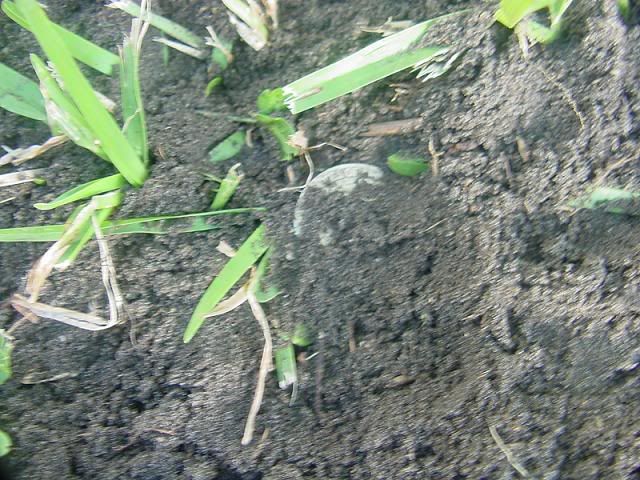
It was obviously a quarter. It had been three years since I last found a silver quarter. This one looked nice, too!
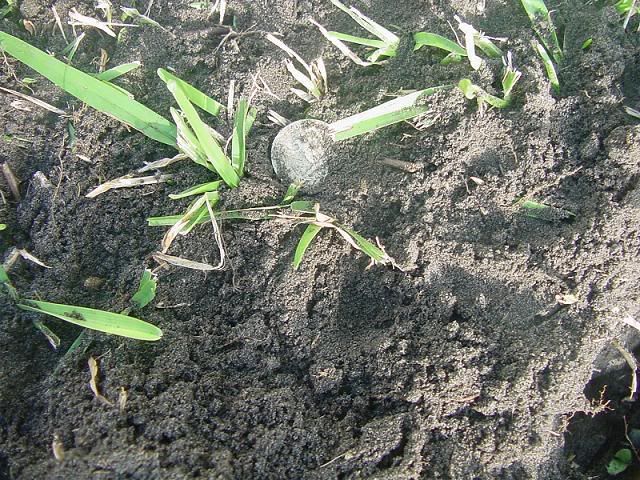
I hastily turned it over to see the date: 1958.
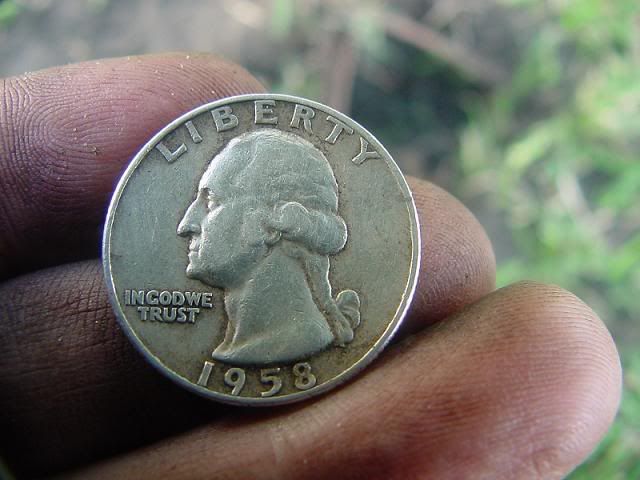
The "D" mintmark on the reverse, below the eagle, showed it to be a Denver Mint coin.
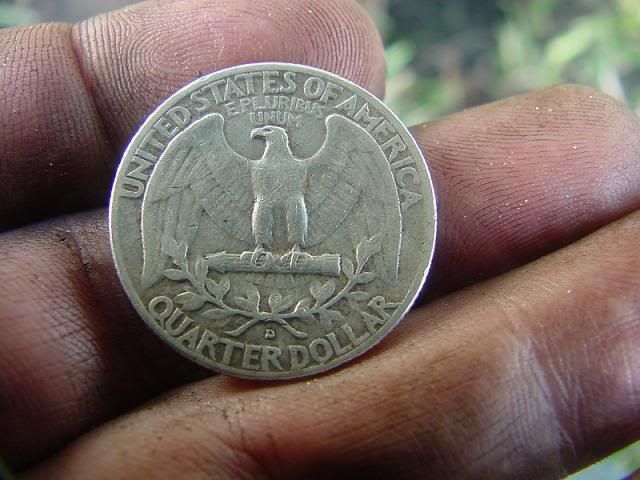
This is now Coin #295 in my "keeper" album. It is my 185th silver coin, and the 15th silver Washington quarter I've found. As with the War nickel found earlier, it's also a date I hadn't dug previously, so it fills a gap in the dug coin collection!
Now with ten Wheat cents, a War nickel, a silver quarter, and a vintage toy badge, I was content. I told Ty that if I found nothing else that day, I would still be very happy with my results. Sure, we still hadn't found those elusive Indian cents and Barber dimes, but it had been my best day detecting in a long time.
Ty asked if I wanted to hunt the house next door on the corner, another big Victorian. He said this one had been moved to the lot from somewhere else, after a previous old house had burned down some time ago. He not only had permission to hunt it, but was friends with the owner, who was the person who'd loaned him the metal detector. Ty mentioned that the homeowner's wife had given him the detector some years ago, and she'd since passed away. I could see her personal touches around the yard- though overgrown and somewhat worse for wear, her gardens and flowerbeds still flourished, and had little ornaments and animal or bird figurines in them- evidence of a lady who'd loved her gardening. It made me sad, since my own wife loves to garden, and I couldn't imagine living alone while her flowerbeds and garden grew wild around me. The corner lot, while in a prime location for old coins and relics, was a little depressing for me, and it was difficult to detect because of the sprawling greenery and a number of large signals. There seemed to be an awful lot of metal in the ground; perhaps this was debris left over from the fire that claimed the previous house. I'm sure there were goodies to be found there, but it wasn't going to be easy, and all I found were a couple of pulltabs and pieces of scrap metal. I told Ty I wanted to go back to where we'd been hunting all day, and he agreed.
Upon our return to the house at #1020, I found a 1947 Wheat cent only about two feet away from where I'd begun the day with my War nickel. I had to have passed over it when I first turned on the detector. I don't see how I could have missed it, but I had. That happens. Over on the left side of the yard, I got an old brass button that gave me a start at first, thinking I'd found a good-sized coin. It had a plain front and a completely rusted tin back on it. Near it, I found yet another Wheat cent, this one a 1933, which pleased me, since some of the Depression-era cents are a little bit scarcer. One more Wheatie gave me a final count of thirteen. Ty had three or four, and also a silver ring marked "Sterling" inside. Exhausted, filthy, and sweaty, we decided to call it a day, and a fruitful day at that.
My final coin tally consisted of 13 Wheat cents dated 1912, 1917, 1925, 1933, 1940, 1941, 1944, 1946, 1947, two 1951, a 1952-D, and a 1954-D. I also had the 1945-S War nickel and 1958-D silver quarter that were destined for my "keeper" album. By comparison, my modern coin count was five Memorial cents, four clad dimes, and two clad quarters, so I found more old coins than I did modern ones, even if the earlier coins like Indian cents and Barber dimes eluded me. We might make another attempt at finding those later!
Not only was the ratio of older coins to modern coins excellent, but the ratio of coins to trash was also good. I'd only found three or four pulltabs, a couple of "rusty crusties", a nail or two, and none of the usual shotgun shells and cartridge casings I find on almost every outing. I am thankful that the two square-topped 1920s-vintage copper roofing nails I dug were the only ones. In some old yards I have hunted, they can be a plague, because they'll give a solid "penny" signal every time.
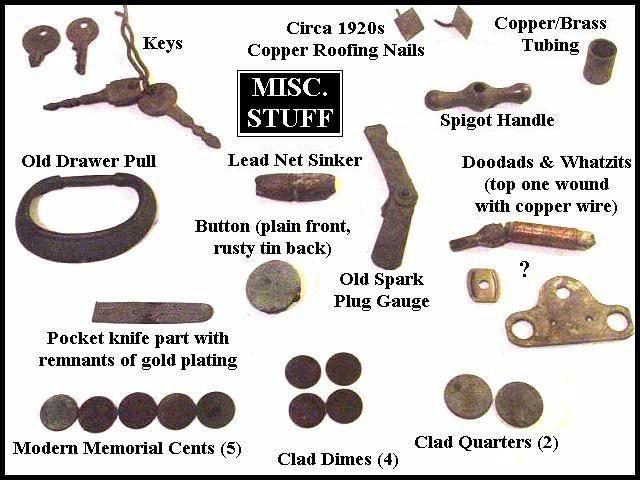
This day's "Wheat" harvest was one of my best ever, perhaps surpassed only by the time I found a small cache of 22 of them in the same hole.
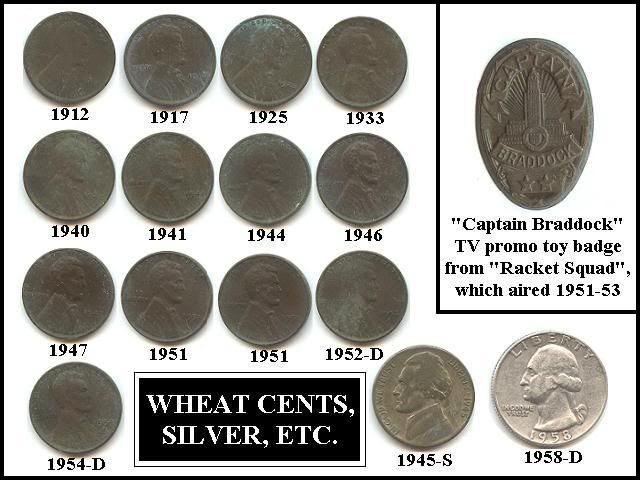
As twilight approached and I headed home, I paused a block or two from Hanover Square, on Bay Street at the waterfront. There I snapped a photo of the masts of an old sailing ship towering over the roof of a building. It was sort of a glimpse of the past, since a century and more ago, the waterfront here would've been a veritable forest of such masts. A handpainted sign said this ship was the barquentine Peacekeeper, so apparently it is now calling Brunswick its home port.

-RWS
Previously on "Digs O' The Day": (9/25/07) Gascoigne Bluff, Old Post Road, Old Town Brunswick
I finished Saturday's hunting on the mainland in Hanover Square, a city park, but didn't get much detecting done, because I ran into my new friend Ty Herig, who lives adjacent to the park. Ty had just started metal detecting, and had a borrowed detector with him. We struck up a conversation while his dog (and cat!) followed us around the square.
The sun set on us before there was much time to find anything, but he did invite me into his backyard for a few minutes and I dug an old brass handle of some sort that probably came off a carriage door. I gave it to him, since he found it interesting. As I have a whole drawerful of stuff like that, I wasn't terribly impressed with the find, myself. Ty mentioned an old token he'd found in the yard of an old house nearby.
"It says 'ATLANTIC SHRIMP COMPANY, BRUNSWICK & ST. AUGUSTINE', and it's about the size of a quarter," he remarked.
I said, "Wait, don't tell me- the reverse says 'GOOD FOR 15', doesn't it?"
"How'd you know that?"
"Because I dug one just like it nine or ten years ago, over near King's Square. It's one of my favorite old tokens. Note that it doesn't say 'good for fifteen cents. It just says 'GOOD FOR 15'. That always made me wonder. Good for fifteen what? Shrimp?
"I was talking to an old timer about that," he replied. "Apparently it was a voucher of some sort. You see, the shrimp company only paid on Fridays, so they handed out these tokens to the shrimpers when they brought in their catch. The shrimpers cashed the tokens in at the end of the week."
"Aha! So maybe it was good for 15 pounds of shrimp? I mean, it showed that the shrimper had brought in fifteen pounds, or something like that? Fifteen still seems like a strange number for a token."
"Yeah, it was something like that. Anyway, I was really happy to find it. And I found an old Cracker Jack toy while digging- it was this little guy with a guitar, and I'm a guitar teacher, so that's kind of neat."
"I'll bet you were psyched. I was really happy when I dug mine, and considered the find to be as good as an old silver coin would've been. And your little guitar guy you found must be a good omen- you must be destined for great finds. By the way, regarding that token, I did some looking in the city directories when I found mine, and I believe the Atlantic Shrimp Company was listed in the 1934 directory but not in the 1937. Or something like that. It was hard research because the library had a lot of gaps in the old directories. But the tokens likely date somewhere between the 1890s and 1930s."
(Here's a picture of my Atlantic Shrimp token. I dug it back in April of 1995. Mine was found only a couple of blocks from where Ty got his, and also on Richmond Street, near the corner with Prince Street. I dug it in a sidewalk strip near King's Square.)

I asked him about where he'd found his. "So, you say you found your shrimp token at the old house two doors down?
"Yeah, the house is under renovation and the owner lets me detect there. Wanna go look at it?"
"Sure!"
So we went and looked at the house, a lovely old Victorian that had been built in the 1880s, as had most of the block. Ty said we could hunt it Sunday if we wanted. I took one look at that front yard, which faces Hanover Square, and I knew I wanted to hunt there very badly, indeed. Visions of Indian cents and Barber and Seated Liberty dimes filled my head, and I practically salivated at the thought of detecting there. I seldom get the chance to search such pristine territory, since I am fairly shy about knocking on people's doors and asking permission. I feel like a salesman or telemarketer making cold calls. So I usually end up hunting public property, which means the same old parks, sidewalk strips, and medians, over and over again. Those public places still produce for me, but the easy finds are long gone, and my haul of old coins and relics seems to grow smaller every year. But of course I don't go out detecting as much as I used to.
I could scarcely sleep for anticipation of having a fresh detecting site. Sunday dawned cloudless and mild- a gorgeous, postcard day for detecting! My wife and I went out for breakfast and I called Ty to let him know I was on the way. Since he had said he wanted to sleep in a bit, we had agreed to meet after 10:00 AM, but by the time my wife and I finished breakfast and I got to Ty's house, it was after 11:00, and the day was becoming pretty warm.
Before leaving, I'd taken a silver coin with me to give to Ty, to thank him for getting me into one of his detecting sites. I thought maybe I'd have a little fun with him, too, and "plant" the coin somewhere near him so he would "find" it with his detector and get an adrenaline rush. For this purpose, I selected a 1780 Maria Theresia thaler restrike out of a batch of silver I'd recently bought: a big, hefty piece of silver. Because these were struck by the Austrian mint well into the 20th century, they aren't as old as their "1780" date suggests, but they still have as much silver as an original, making them worth ten bucks or so on today's market. And I didn't think Ty was likely to know much about them, so his finding a big silver coin dated 1780 could be very amusing to watch. Unlike a lot of the restrikes, this one was actually well-circulated, too, making it look pretty old. (Well it is pretty old, just not 227 years old like the date would indicate). Into my pocket it went, for future pranking purposes.

As I rolled up in front of Ty's house, I saw him waiting on the porch, with Lily the dog and Mikey the cat in attendance, as usual. The cat was dirt-rolling on the sidewalk in some sort of strange feline greeting ritual- I find my own cats doing this when I get home from work. They run up to greet me, and then start rolling on their backs. It's pretty funny.

After greetings and a brief chat, we walked two doors down to the house were going to detect. I briefly crossed the street and stood in Hanover Square to snap a picture of the house, which is at 1020 Richmond Street.

I decided to sweep the front yard in a back and forth "lawnmower" pattern, rather than my usual random zigzags. Once inside the gate, I started with the right side and began working along the edge of the property, where the fence runs along the sidewalk. It wasn't long before I had my first signal, which registered in the middle scale, roughly between the "pulltab" and "screwcap" ranges on the meter. Lots of trash items are found in this range, but so are many old Indian Head cents and some gold rings. This signal had a little depth to it, about four inches, so it was worth digging.

With visions of Indian cents again dancing in my head, I was momentarily surprised when I turned the plug back and found the coin perfectly placed within it.
It was immediately obvious that my first find of the day was a silver coin!

I could see it was a War nickel, so called because the United States struck five-cent pieces in 35% silver during World War II, from 1942 to 1945. Not only does their silver content give them a slightly different color, but they also have a large mintmark over the dome of Monticello on the reverse. I could see the big "S" mintmark of San Francisco over the building's dome, and the coin was a silvery color, while a regular dug nickel would have been a dirty reddish brown. That's the beauty of silver, even lower-standard silver like the .350 alloy in the War nickels. Our modern coins turn all ugly and dirty in the ground, while the older coins with precious metal content like silver and gold often stay nice and bright- for decades, if not centuries.
This was a 1945-S War nickel. It is now Coin #294 in my "keeper" album of dug coins, my 183rd silver coin, and my tenth War nickel. It's also a date I hadn't dug previously. So while it's not a tremendously valuable find, it is silver, and silver is good! And I added one for the book, so that made me happy. The day was off to an auspicious beginning.

Ty came over with a 1957-D Wheatback cent, the first "Wheatie" of the day. Surely there would be more. For a novice detectorist, digging a Wheatie is usually a thrill. Ty had already crossed that threshold and dug three or four, but he was pleased. Maybe he'd get his first silver coin today. He admired my War nickel.
My next signal had a little depth to it; four or five inches or so, according to the detector's meter, and it signaled very much like a coin, hovering near the "penny" and "dime" range. A coin at four or five inches in a yard like this could very possibly be from the late 19th century. For some reason I got strong visions of a Barber dime, and the feeling that I'd be going home with at least one. (For non-numismatic readers, the "Barber" dime is named after its designer. They were struck from 1892 to 1916, in silver, of course). I knew without a doubt in my mind that there were at least a few (if not a lot of) Indian cents and a Barber dime or two in this yard.
Alas, this signal did not turn out to be my much-anticipated Barber dime. It was an old coin, though: a 1925 Lincoln cent. My first Wheatie of the day. Wheaties are always a good sign, and earlier Wheaties even moreso. I don't put Wheat cents in my "keeper" album, having found a quart jar full of them over the years, but I still enjoy digging them. Where there are Wheaties, there are often nice silver coins, too. I find that my ratio is usually about ten Wheaties for every silver coin.

Not long after that Wheat cent appeared, I dug another. And then another, this one from 1912. So the old stuff was coming up, now! Right next to the 1912 I found yet another Wheatie, this one from the 1950s. The 1912 was well-circulated, while the 1950s cent was high grade, and it looked like they could have been dropped at the same time. Not very far from those, but perhaps not in the same spill pattern, I dug a 1917. It came out of the ground looking quite nice for a dug Lincoln cent.

The Wheaties were popping up everywhere. Sometimes they read in the penny-dime range on the detector's meter, and sometimes they fell down into the middle range below coin level. This happens sometimes when a coin has been in the ground a long time. The earlier Indian Head cents often read well below "penny" range, as I mentioned earlier. So far no Indians had appeared, but they had to be out here.
By now the sun was high in the sky and after working the middle of the yard, away from the shade, I was starting to sweat and feel thirsty. What started out as a gorgeous, mild day was still gorgeous, but turning rather hot. Soon the sweat began to drip off my forehead and run down my nose. Ty took a break and walked back to his house, returning with some cold bottles of water. They were a welcome relief, because after a big breakfast and all that physical exertion in the bright sun, I was starting to feel a little woozy. While we took our break the owner of the house drove up, and chatted with us before going inside to supervise the painting and renovation inside. We thanked him for his hospitality.
After resuming the hunt, I kept finding Wheat cents. Soon I was up to eight, then nine. The ratio of trash to coins was very good. I dug one or two pieces of junk and the odd artifact or two, but the coins kept right on coming, and I was finding more old Wheat cents than I was modern coins. When I found the tenth Wheatie, I began to wonder where those Indian cents and the Barber and Mercury dimes were hiding. By this time I had a pocketful of coins and stuff and had completed my loose "lawnmower" pattern of both halves of the front lawn.
Ty often asked me to check his holes with my detector, to get a second opinion about some signals. When he asked for help pinpointing one particular signal, I knew the moment for "The Prank" had arrived.
Secretly slipping the Maria Theresia thaler from my pocket, I palmed it and made a pretense of digging around in his hole. While my hand was down in there, I shoved the big silver coin into the dirt in the side of the hole. I told him I thought the target was a little to the right, and walked off as he resumed poking around. Suppressing a chuckle, I looked back as he dug around a bit, and then I watched the expression on his face change as he brought something out. He stared at it silently for a second, then let out a quiet, rather subdued expression that sounded something like. "Whoa, Betty." Then when he started to stand up and come towards me, I could see his eyes had widened considerably. Rather than jubilant and shouting, he seemed a bit stunned.
Haha. Gotcha.
"Hey, Rob, look at what came out of that hole! WHAT IS IT!?!"
"It's a 1780 Maria Theresia thaler," I said, without even looking.
"Wow, you knew what it was, just like that? How?"
"Because I put it there."
"Whaaa-!? AW, MAN! No, you didn't!"
"Yep. Sure did," I said with a grin. "I wanted to give you a little somethin' to thank you for inviting me here today, but I also wanted to have a little fun with you."
He tried to give the coin back, but I told him no, I wanted him to keep it. I explained to him how it was a restrike, and I wasn't giving him a rare coin worth thousands of dollars, but rather a "thank you" gift of a bit of silver. I often play pranks like this on people, but I always confess in the end, and let them keep the coin. Then I went back to his hole and found his actual target, which was out in the loose dirt on the ground. It was a crusty modern zinc cent. "Here's your real target," I said, flipping it to him.
After the hilarity of "The Prank" subsided, we decided to go around to the even larger back yard and try things out. It was bare dirt, having been scraped and plowed up in the course of the renovation. Normally I prefer "naked dirt" for detecting; it's easier to dig in, for one thing. But it was obvious that this back yard had been thoroughly trashed- we could see bits of trash like aluminum cans and pieces of pipe on the surface, and there was a big construction dumpster and a lot of junk lying around. I soon decided the back yard was not my idea of fun. No doubt it had its share of old coins and goodies, too, but it would take considerably more patience to hunt, and knowing I had proven results in the front yard, I decided to go back.
I dug some more trash in the front yard, and battled with roots several times. Exasperated, I told Ty about my "Ten Wheaties to One Silver" ratio, which meant I was due for some silver. But I just wasn't finding it. Sure, I'd started the day with a 35% silver War nickel, but those elusive 90% silver dimes and quarters (and halves and dollars, oh my!) were still playing hard to get.
Three or four times I got "quarter" signals, but two of these turned out to be modern clad quarters, while the others turned out to be things like brass keys and an old spigot handle and an old spark plug gauge. On one signal I dug a pair of old Ford keys-both the trunk and ignition keys were strung together on a twist of heavy-gauge wire. Ty joked, "I'll bet those are from a '68 Torino," and he might have been right, but I remember my old '84 Ford van having the same kind of keys. He was probably closer to the truth, though- these had been buried quite a while. I can imagine the car owner cursing as he paced around the house and yard, looking for his lost keys.
Snap! Ty broke his cheap gardening trowel in two while digging. Every beginning detectorist starts out with one of those, which invariably bends and then breaks within two weeks, if not sooner. It must be a rite of passage. I loaned him my raggedy-looking but basically indestructible hori-hori knife, since I also had a small contractor's shovel with me. The shovel could cut through small roots better than the dull hori-hori knife, but wasn't as good for precision work around and under the roots that were too big to cut.
Then I got another coin range signal. I dug down, finding a network of criscrossing roots, as usual. Damn. These were becoming a real aggravation. It seemed like every hole was full of them. Since Ty had my hori-hori knife, I had to work between the roots with my fingers, as they were too thick for the shovel to cut. Finally, after some Herculean tugging, I was able to part them enough to get around them with my fingers, and after five or ten minutes of struggle and a few ant bites to my hand, I found...
Nothing.
The signal vanished. Grrr! I kept trying, but I couldn't get anything, despite widening the hole and going deeper, digging halfway to China. This happened several times to both of us. Sometimes it was because of a rusty iron target breaking up, but other times, well... who knows?
So it goes. You can't hit a home run every time you're up to bat.
The next signal was a midrange one, and produced a small, oval-shaped toy badge. It said "CAPTAIN BRADDOCK" on it and looked similar to a miniature Los Angeles police badge. I figured it must have been a premium from some old radio serial or early TV show from the 1940s or '50s. An Internet search upon my return home showed that Captain Braddock was the lead character in a TV show called "Racket Squad", which aired from 1951 to 1953. The title referred not to tennis, but to racketeering- apparently Captain Braddock made his living in TV Land by busting con men and fraudsters. While I'd never seen the old black and white show, I can imagine it: I'm sure he had a hard, nasal voice and barked out commands to his underlings while delivering snappy, sarcastic one-liners to the crooks he busted. The old TV promo badge and the occasional marble that turned up in the course of digging were sure clues that this yard had been a play spot for children fifty years ago. Perhaps this also explains the large number of pennies, too.
Ty wandered around the side of the house and dug a few targets from under the pine straw. He came back around with something to show me. It was a nonmetallic artifact, not something he'd found with the detector, but rather an item which had turned up in one of the holes he dug. It was a little man with a huge head and bared teeth, who looked like he was screaming, or singing. It was made of red plastic and might have been thirty or forty years old. It did have a rather 1960s Beatlemania look to it. Ty said, "He's got a guitar, too."
"No way," I said. "You've gotta be kidding me."
He wasn't. Sure enough, when the dirt was brushed away from the little figurine, it could be seen that the strange little red toothy guy was playing a guitar!
So Ty, the professional guitar teacher, had now dug TWO vintage toy figurines with guitars, completely by accidental circumstance, since both were plastic and would not have given a signal on a metal detector. How bizarre.
Again I told him, "It must be some kind of an omen. Somebody is trying to tell you something."
Not long after that, I was in the right half of the front yard, not far from where the toy badge had turned up, and yet another coin range signal rang out. This one read "quarter" at six inches. I could barely get the shovel into the ground. More stinkin' roots. I could see I was going to have to work for this one... it took a while. Eventually, the detector sounded off not on the hole, but on the pile of dirt I'd extracted, so I knew the target was up. Gently combing the dirt with my fingers, I couldn't find it at first. Then, I saw that glorious sight I'd longed for... the whitish edge of a silver coin!

It was obviously a quarter. It had been three years since I last found a silver quarter. This one looked nice, too!

I hastily turned it over to see the date: 1958.

The "D" mintmark on the reverse, below the eagle, showed it to be a Denver Mint coin.

This is now Coin #295 in my "keeper" album. It is my 185th silver coin, and the 15th silver Washington quarter I've found. As with the War nickel found earlier, it's also a date I hadn't dug previously, so it fills a gap in the dug coin collection!
Now with ten Wheat cents, a War nickel, a silver quarter, and a vintage toy badge, I was content. I told Ty that if I found nothing else that day, I would still be very happy with my results. Sure, we still hadn't found those elusive Indian cents and Barber dimes, but it had been my best day detecting in a long time.
Ty asked if I wanted to hunt the house next door on the corner, another big Victorian. He said this one had been moved to the lot from somewhere else, after a previous old house had burned down some time ago. He not only had permission to hunt it, but was friends with the owner, who was the person who'd loaned him the metal detector. Ty mentioned that the homeowner's wife had given him the detector some years ago, and she'd since passed away. I could see her personal touches around the yard- though overgrown and somewhat worse for wear, her gardens and flowerbeds still flourished, and had little ornaments and animal or bird figurines in them- evidence of a lady who'd loved her gardening. It made me sad, since my own wife loves to garden, and I couldn't imagine living alone while her flowerbeds and garden grew wild around me. The corner lot, while in a prime location for old coins and relics, was a little depressing for me, and it was difficult to detect because of the sprawling greenery and a number of large signals. There seemed to be an awful lot of metal in the ground; perhaps this was debris left over from the fire that claimed the previous house. I'm sure there were goodies to be found there, but it wasn't going to be easy, and all I found were a couple of pulltabs and pieces of scrap metal. I told Ty I wanted to go back to where we'd been hunting all day, and he agreed.
Upon our return to the house at #1020, I found a 1947 Wheat cent only about two feet away from where I'd begun the day with my War nickel. I had to have passed over it when I first turned on the detector. I don't see how I could have missed it, but I had. That happens. Over on the left side of the yard, I got an old brass button that gave me a start at first, thinking I'd found a good-sized coin. It had a plain front and a completely rusted tin back on it. Near it, I found yet another Wheat cent, this one a 1933, which pleased me, since some of the Depression-era cents are a little bit scarcer. One more Wheatie gave me a final count of thirteen. Ty had three or four, and also a silver ring marked "Sterling" inside. Exhausted, filthy, and sweaty, we decided to call it a day, and a fruitful day at that.
My final coin tally consisted of 13 Wheat cents dated 1912, 1917, 1925, 1933, 1940, 1941, 1944, 1946, 1947, two 1951, a 1952-D, and a 1954-D. I also had the 1945-S War nickel and 1958-D silver quarter that were destined for my "keeper" album. By comparison, my modern coin count was five Memorial cents, four clad dimes, and two clad quarters, so I found more old coins than I did modern ones, even if the earlier coins like Indian cents and Barber dimes eluded me. We might make another attempt at finding those later!
Not only was the ratio of older coins to modern coins excellent, but the ratio of coins to trash was also good. I'd only found three or four pulltabs, a couple of "rusty crusties", a nail or two, and none of the usual shotgun shells and cartridge casings I find on almost every outing. I am thankful that the two square-topped 1920s-vintage copper roofing nails I dug were the only ones. In some old yards I have hunted, they can be a plague, because they'll give a solid "penny" signal every time.

This day's "Wheat" harvest was one of my best ever, perhaps surpassed only by the time I found a small cache of 22 of them in the same hole.

As twilight approached and I headed home, I paused a block or two from Hanover Square, on Bay Street at the waterfront. There I snapped a photo of the masts of an old sailing ship towering over the roof of a building. It was sort of a glimpse of the past, since a century and more ago, the waterfront here would've been a veritable forest of such masts. A handpainted sign said this ship was the barquentine Peacekeeper, so apparently it is now calling Brunswick its home port.

-RWS
Previously on "Digs O' The Day": (9/25/07) Gascoigne Bluff, Old Post Road, Old Town Brunswick
0

Comments
http://www.24hourforums.com/view_topic.php?id=15197&forum_id=124
DOTD 9/30/07
http://www.24hourforums.com/view_topic.php?id=15196&forum_id=124
Ming Medallion
http://www.24hourforums.com/view_topic.php?id=11984&forum_id=124